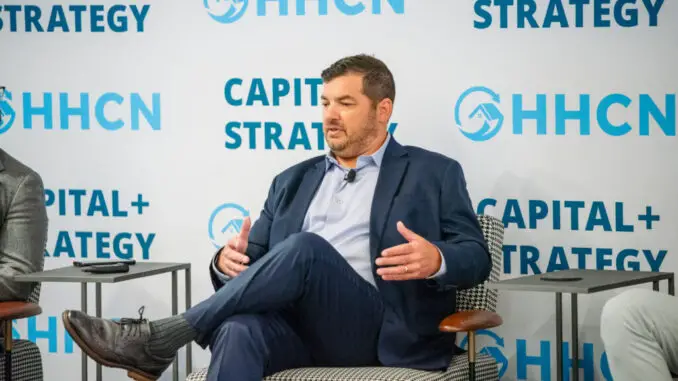
Home-based care stakeholders are navigating a very different environment than they were in the past. No one understands that better than prolific acquirers like HouseWorks, PurposeCare and Care Advantage.
All three companies are doing unique things to maintain growth in 2024, however.
Firstly, over the last few years, there has been a vast chasm between buyers and sellers. That gap may be beginning to close, however.
“That gap between expectation, and what buyers are willing to pay, has closed considerably,” Cameron Cordts, corporate development manager at PurposeCare, said during a panel discussion at Home Health Care News’ Capital + Strategy conference. “I think PurposeCare found more success on the proprietary lead side as well.”
Cordts noted that the majority of PurposeCare’s growth has come from harvesting these proprietary leads.
Backed by the health care-focused private equity firm Lorient Capital, PurposeCare delivers both clinical and non-clinical home-based care. The company has been very bullish when it comes to M&A. Since the PurposeCare’s launch in 2021, the company has completed 14 acquisitions, mostly, across the Midwest.
On its end, HouseWorks self-sourced eight of its last ten deals, according to CEO Mike Trigilio.
The InTandem Capital-backed HouseWorks has earned a reputation for being one of the most active buyers in the home-based care space — ballooning it into a $400 million company. HouseWorks delivers in-home care and has meal delivery and laundry businesses. The company is also involved in the adult day space.
“We are trying to be a solution provider for the payer versus just delivering home care,” Trigilio said during the discussion.
Over the last six years, Care Advantage has closed 21 deals. When it comes to acquisition targets, the company has focused on personal care and other complementary services.
“How can we do some of those things that aren’t a hop, skip and jump away from [personal care], but a step away from that?” Jaron Clay, VP of integrations at Care Advantage, also said. “So we’ve also dipped our toes into adult day. We’re focusing on companies that really target non-English speaking populations, who are otherwise excluded from the care continuum. That has proven to be a very sticky, and profitable business for us, but most importantly, a really rewarding one.”
Richmond, Virginia-based Care Advantage is a home-based care company that has more than 45 locations throughout Virginia, Maryland, Delaware, Washington, D.C., and North Carolina. The company offers both personal care and home health care services.
Clay knows that a potential acquisition target is a good fit when the company aligns with Care Advantage’s drive to grow.
“Do they have that same attitude?” he said. “Are they happy with exactly how their company is today, or are they chomping at the bit to grow, and have the tools they need to make their company bigger to plug into our power grid? We’ve absolutely walked away from deals that looked excellent on paper because that attitude was not there when we went to meet that leadership team that was going to stay on.”
Though HouseWorks typically avoids acquisition targets that could be categorized as distressed, the company sees an opportunity in its ability to streamline an organization.
“We do like looking at those businesses and saying, ‘What’s wrong?’” Trigilio said. “‘What are the pieces that we can fix?’ A lot of it revolves around our technology and our solutions that we put into play, basically day of close. Some of those things can be mitigated very quickly.”
Similarly, Care Advantage has been able to help acquisition targets solve key challenges.
“There are companies that have been able to identify a problem, and we felt we had a quick solution for them, particularly around talent acquisition,” Clay said. “That is just what we hear over and over again, ‘It’s so hard to get caregivers.’ We’ve done a lot of investments around that at Care Advantage. We think we have a better mousetrap, so we’re open to companies that need a little help, but don’t have a litany of problems.”
At PurposeCare, a strong org chart and a company with aggressive growth goals is the main identifier for if an acquisition target is a cultural fit for the company, Cordts noted.
Looking ahead, HouseWorks M&A focus is fixed on the Medicaid space, and finding opportunities to add auxiliary services to its overall offerings.
On its end, PurposeCare is watching out for regulatory updates that could impact business, such as the Medicaid Access Rule and the upcoming home health proposed payment rule.
At Care Advantage, the focus remains on culture.
“It goes back to that culture — always,” Clay said. “Are you doing an excellent job lifting up your communities? Are you doing an excellent job for your clients? If not, this is probably not going to be a fit for us, because we’ve worked very hard to have the reputation and the outcomes that we do. We’re not willing to lose those for a quick win.”
The post Prolific Acquirers: The M&A Strategies Behind HouseWorks, Care Advantage And PurposeCare appeared first on Home Health Care News.
